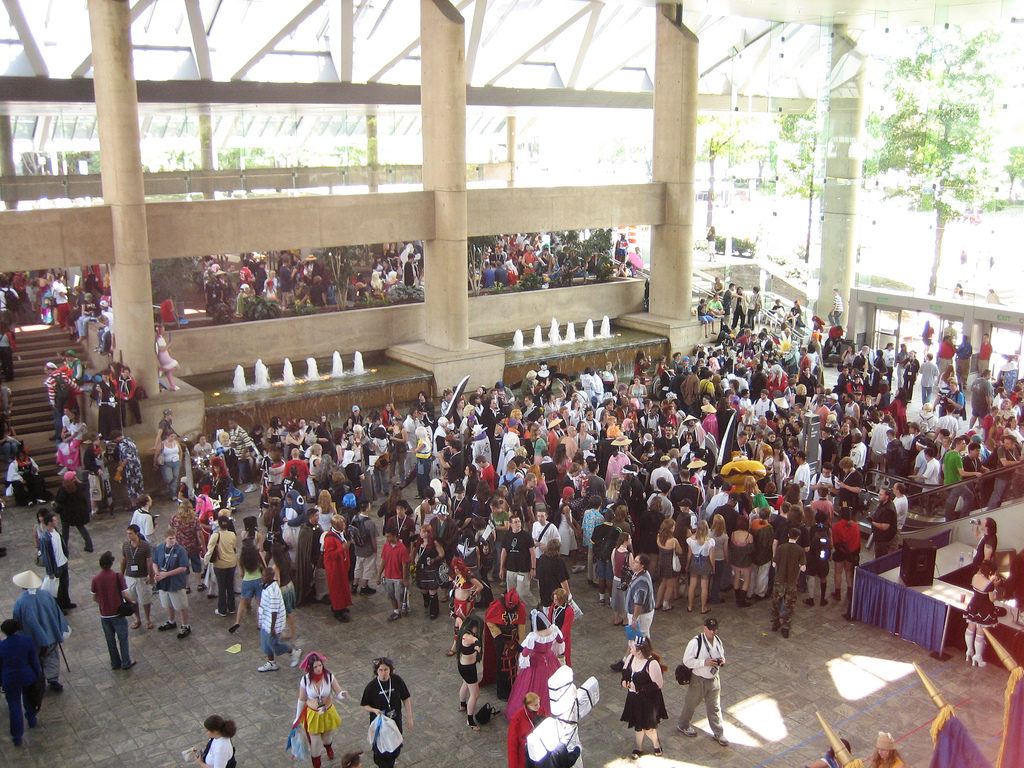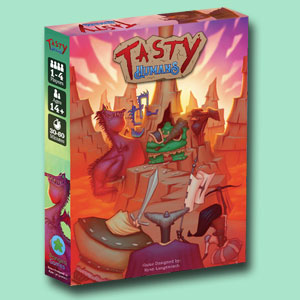Board game conventions are the flashiest events in board gaming. Some are gigantic like Gen Con, Essen, and UKGE. Others are close-knit and local, but still lots of fun. They are wonderful gathering places for board gamers. It should come as no surprise that many game creators go to conventions to pick up customers.
Looking for more resources to help you on your board game design journey?
Here you go: no email required!
Like this writing style?
Check out my latest blog on marketing here.
Getting started with board game conventions can be complex, so I’ve brought in Emelie Van Rodin, creator of State of Wonder, a strategy card game for 2 or more players where you play as the ruler of city-state in a kingdom struck by civil war. You can buy it here now.
I’m fascinated by Emelie’s story because she Kickstarted a game and made a few thousand bucks. What’s unusual is that she – at least to the casual observer – appeared to come out of nowhere. I believe her story will be of special importance to many of you who want to get your foot in the door for the first time. This is how you do it.
This is the second of two posts – the first one is here.
We interviewed via Discord direct messages which have been lightly edited for clarity and flow. This interview is broken into three parts:
- Types of Cons
- What Are Cons Good/Bad For?
- Parting Advice
Types of Cons
Brandon: What are the different types of conventions out there?
Emelie: I see it as 4 (maybe 5) types of conventions.
First one is Unpubs/Design Cons. I don’t have any experience on these as they are super rare in my area.
Second one is small, local cons with anything from 50 attendees to 1000. These are often very cozy and a great place to show off a review copy or a product print proof to interested people.
Third one is large event conventions, where people go to events. I would say Grand Prix in Magic is large con in this style. DreamHack too. They are not focused on companies and new products, but often around people playing games.
Fourth one is large advertisement cons such as E3, GenCon, Essen, UKGE and more, where companies go specifically to get a booth and show off new stuff to an audience that expects it.
Fifth one, if they count, is conferences. These are industry-specific events where professionals in the industry go to meet up, talk about important things within the industry that are happening, and hold panels/lectures. Some also mix in booths to show off game prototypes which are ready for industry/semi-public viewing
Brandon: This is a great answer. I can’t even think of anything to add 🙂
What Are Cons Good/Bad For?
Brandon: What is each convention good for and bad for?
Emelie: I would guess Unpubs are good to test ideas and tweak designs. 😉
Brandon: They are.
Emelie: The second and third ones – small cons and event cons – are where I would start building my audience. You can reach early adopters test how well your product actually resonates with the intended people. Why it doesn’t work at Unpubs or conferences is because other designers are seldom your audience.
The fourth type – large advertisement cons – is great for spreading an established game/product with an already built audience. It is also a great chance to meet up with and network with other industry people.
Conferences are the best for networking and also honing your trade, whatever that trade is. There will often be lectures on anything from animation, illustrations, UI/UX design, game development, design, and self-publishing depending on the conference. It is also a great chance to meet some of the most skilled people in the industry as they are often the speakers and panelists at these events.
The second and third ones – small cons and event cons – are definitely bad at reaching more casual players. Casual players rarely go to cons. You won’t catch kitchen gaming Magic players there. You will catch the hardcore, go and grind tournament crowd.
The fourth one – large advertisement cons – are better at catching that casual crowd but you will seldom compete with the budget and reach of a bigger company, so it can be very hit and miss. If you are at a large advertisement con, and you notice that you are not able to spread the game, go mingle and network and leave one person in the booth to just cover it. Use the time well when you are there.
I think the weakness of the fifth one – conferences – is that the people there are never there to “find new hobbies.” So they won’t put much effort into your product but rather into you, your skills, and other people’s skills.
Brandon: I’ll say that just about any convention is more for networking than marketing, too.
Emelie: That is also true, but who you network with and your goal in networking differs.
Brandon: A lot of people conflate the two. They’re not the same. Networking is meeting people who you may help and who may help you. Marketing is more about generating leads and actually getting people to buy things.
Emelie: Yeah, marketing is about selling stuff and you can sell stuff at cons. But getting to know other devs or gamers that want to help you out spreading the game will help you later on.
Getting to know your early adopters and the people that enjoy your product is such a huge help. It allows you to understand who they are and what they like about your game.
Even if you have 100 target audience profiles, actually knowing people who fit those profiles will help you make better target audience profiles.
Brandon: Cons are a part of a bigger picture. Like you said, one way this can help is to put you in touch with an actual audience instead of an imagined one. It can get you out of your head, so to speak.
Emelie: “It can get you out of your head, so to speak.” This is so important.
Brandon: Trying to do too much without others’ input is dangerous.
No matter how smart or experienced you are.
Parting Advice
Brandon: Last question.
Gonna hit you with the hard one.
If there were one critical piece of advice which you could give to game developers who have never gone to a convention before, what would you tell them?
Emelie: There are two things actually and I can’t decide which one is the most important:
- Take care of yourself, both for yourself and others. Eat and sleep well, bathe, and take breaks.
- Cons are often semi-professional. Don’t bring up that thing you do in your bedroom while working your booth. But a fun anecdote from your life about driving/gaming/working/sports etc. can help you bond and create lasting work relationships.
Brandon: #1 is huge – possibly the biggest one. No game is worth self-destructing over.
Emelie: And being slobby or roughed up due to working too much can actually hurt your brand as well.
Brandon: When you’re actually at a con talking to people, #2 is big. I’d treat it like casual Friday at work. It might have a looser feel than work most days, but it’s still work and you still have to be professional and polite while being approachable.
Emelie: That sounds about right. Don’t be afraid to let loose and be casual, but also remember that these people are semi-strangers and you’re at work.
Brandon: Well said.
That’s all I’ve got. Thank you very much!
Emelie: Thank you as well for having me! It was great fun to think about what I would have wanted to know before going to cons.
Conventions are exciting, hectic, memorable events. They can be a great way to meet others, share your game, and improve your reach. Go in with a game plan and the right mindset and you’ll be off to a good start!
Are you going to any conventions soon? Got any questions or stories to share? Let me know in the comments below, I’d love to hear them 🙂






2 thoughts on “How to Get Started with Board Game Conventions as a Board Game Creator, Part 2”
I love interview type blogs! They seem to generate the most page views for me when I write an interview blog. Of course, it’s always interesting to get an inside perspective on games since I’m definitely an end user and not developer.
I am heading up a small convention in Turner, Maine called Book Stacks & Boss Fights to support the local library. It’s a first time event, but we are trying to support local authors, game developers and artists. If you are in the New England area, have a new board game you are developing and want to play-test or demo, please get in touch!